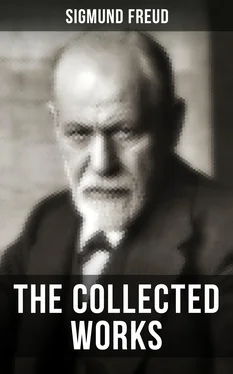Sigmund Freud - The Collected Works of Sigmund Freud
Здесь есть возможность читать онлайн «Sigmund Freud - The Collected Works of Sigmund Freud» — ознакомительный отрывок электронной книги совершенно бесплатно, а после прочтения отрывка купить полную версию. В некоторых случаях можно слушать аудио, скачать через торрент в формате fb2 и присутствует краткое содержание. Жанр: unrecognised, на английском языке. Описание произведения, (предисловие) а так же отзывы посетителей доступны на портале библиотеки ЛибКат.
- Название:The Collected Works of Sigmund Freud
- Автор:
- Жанр:
- Год:неизвестен
- ISBN:нет данных
- Рейтинг книги:4 / 5. Голосов: 1
-
Избранное:Добавить в избранное
- Отзывы:
-
Ваша оценка:
The Collected Works of Sigmund Freud: краткое содержание, описание и аннотация
Предлагаем к чтению аннотацию, описание, краткое содержание или предисловие (зависит от того, что написал сам автор книги «The Collected Works of Sigmund Freud»). Если вы не нашли необходимую информацию о книге — напишите в комментариях, мы постараемся отыскать её.
Introduction to Psychoanalysis
The Interpretation of Dreams
Psychopathology of Everyday Life
Wit and Its Relation to the Unconscious
Dream Psychology: Psychoanalysis for Beginners
Delusion and Dream in Jensen's Gradiva
Group Psychology and the Analysis of the Ego
Selected Papers on Hysteria and Other Psychoneuroses
Leonardo da Vinci
A Young Girl's Diary
Three Contributions to the Theory of Sex
Beyond the Pleasure Principle
Totem and Taboo
Reflections on War and Death
The Origin and Development of Psychoanalysis
The History of the Psychoanalytic Movement
Freud's Theories of the Unconscious by H. W. Chase
Sigmund Freud (1856-1939) was an Austrian neurologist and the father of psychoanalysis, a clinical method for treating psychopathology through dialogue between a patient and a psychoanalyst. In creating psychoanalysis, Freud developed therapeutic techniques such as the use of free association and discovered transference, establishing its central role in the analytic process. Freud's redefinition of sexuality to include its infantile forms led him to formulate the Oedipus complex as the central tenet of psychoanalytical theory. His analysis of dreams as wish-fulfillments provided him with models for the clinical analysis of symptom formation and the mechanisms of repression as well as for elaboration of his theory of the unconscious. Freud postulated the existence of libido, an energy with which mental processes and structures are invested and which generates erotic attachments, and a death drive, the source of compulsive repetition, hate, aggression and neurotic guilt.












